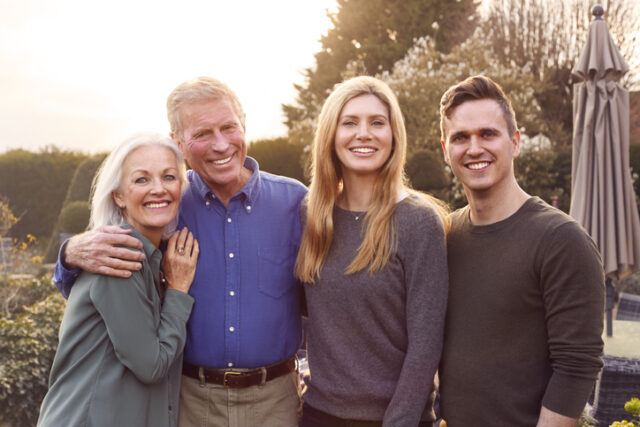Raising kids doesn’t stop once they’re adults—it just moves into a whole new, sometimes awkward phase that nobody really warns you about.

You expect yourself to have it all figured out by this point, but that’s not true, largely because you’ve never navigated this dynamic with your kids before, and that can be overwhelming. Honestly, there are some things a lot of parents of adult kids need to hear, even if most people are too polite (or scared) to say it out loud. You’ll likely never hear these words from people in your life, but they might help you out a bit.
1. Your grown child’s life isn’t a reflection of your success or failure.

It’s so tempting to see your adult kids’ choices as a scorecard for how you did as a parent. However, once they’re grown, their life is about them, not about proving anything about you. Their mistakes aren’t your failures, and their wins aren’t your trophies.
At some point, their path belongs fully to them. You gave them a foundation, sure, but what they build from there is their business. You deserve to feel proud of the relationship you built, not anxious about whether their life lines up with some imaginary grading system.
2. They’re not disrespecting you by choosing a different life.

When an adult child’s choices don’t match what you pictured for them—career, relationships, lifestyle—it can sting. However, it’s not disrespect. It’s them becoming fully themselves, even if that self looks nothing like you expected. Choosing differently isn’t rejecting you; it’s just claiming their own life. The more you respect that, even when it’s uncomfortable, the closer and more honest your relationship can actually become.
3. Giving advice without being asked usually backfires.

It’s so hard not to jump in with suggestions, especially when you see your kid struggling. The problem is, unsolicited advice, even if it’s brilliant, often feels more like criticism than help once your kid is an adult. Most of the time, they just want to be heard and supported, not fixed. If they need advice, they’ll ask. If you wait for the invitation, your words will land a whole lot better, and they’ll actually want to hear what you have to say.
4. Their problems aren’t always yours to solve.

Watching your adult child struggle can be brutal. Every instinct tells you to swoop in and fix it. But part of becoming an adult is learning how to wrestle through challenges without someone else stepping in to make it all better. Sometimes the most loving thing you can do is hold space for them to figure it out themselves. It’s not abandonment; it’s respect. And it’s often what they need to build real resilience, even if it’s painful to watch from the sidelines.
5. It’s okay if they don’t tell you everything.

When they were younger, you knew all the details of their lives—every friend, every assignment, every scraped knee. As adults, they get to decide what they share, and sometimes that means you’ll be a little more out of the loop. It’s not personal. It’s part of becoming their own person. Trust that what they choose to tell you is what they want you to be part of, and that your relationship doesn’t have to hinge on knowing every single thing.
6. Emotional support means way more than logistical help.

It’s easy to offer rides, money, or a spare bedroom. But what adult children often crave more than practical help is emotional support—the kind that says, “I believe in you” and “I’m proud of you,” even when things are messy. Being a safe, steady emotional presence means more than solving problems. It means giving them the space to be fully human with you, not just successful, put-together versions of themselves.
7. You’re allowed to have your own life now, too.

Some parents pour so much into their kids that when the kids grow up, they feel lost. But you’re allowed—and honestly, encouraged—to have a full, vibrant life outside of your role as a parent. Your happiness isn’t supposed to be tethered only to how your kids are doing. Pursue your own interests, friendships, and dreams. It’s healthy for you, and it quietly gives your kids permission to live freely, too.
8. They might outgrow needing your approval, and that’s not a bad thing.

When they were younger, your approval meant everything. As adults, they might not need it in the same way, and while that shift can feel weird, it’s actually a sign that you raised someone confident enough to steer their own life. It doesn’t mean they don’t love you. It just means they’re learning to validate themselves. Your pride and support will always matter, but they aren’t building their life around earning your gold star, and that’s healthy.
9. Boundaries aren’t punishment.

If your adult child sets boundaries—about visits, phone calls, sharing information—it can feel like rejection. The thing is, boundaries aren’t punishment; they’re a normal part of adult relationships, even with the people you love most. Respecting their boundaries, even when you don’t fully understand them, builds trust. It shows you love them enough to honour who they are now, not just who they were when they were little and totally dependent on you.
10. You don’t have to agree with their choices to respect them.

It’s natural to have opinions about your adult child’s decisions. You’re human, and you care. Still, respecting their right to make their own choices doesn’t mean you’re silently approving every move they make. It just means you’re choosing the relationship over the need to be “right.” Sometimes love looks like disagreeing quietly while still standing solidly in their corner, cheering them on even when you would have chosen differently.
11. They still need you, just in different ways.

Just because they don’t need you to tie their shoes or help with homework anymore doesn’t mean they don’t need you at all. They still need your encouragement, your steadiness, your belief in them, even if they don’t say it out loud. The way they need you changes, but the need itself doesn’t disappear. You’re still an anchor for them, even as they sail into totally different waters. Being that steady presence matters more than you might ever hear directly.
12. It’s normal if the relationship feels a little awkward sometimes.

The parent-child relationship shifts a lot as kids become adults. There are growing pains, miscommunications, and weird moments where you’re not sure what your role even is anymore, and that’s completely normal. It doesn’t mean you’ve failed. It just means you’re both figuring it out as you go. Giving each other a little grace during these awkward stretches can keep the relationship strong even when it feels clumsy.
13. Letting them struggle sometimes is one of the hardest, and kindest, things you can do.

Watching your kid struggle is gut-wrenching, no matter how old they are. However, swooping in to rescue them every time actually robs them of the chance to build real strength and confidence in themselves. Letting them face hard things while cheering from the sidelines is an act of love, even if it feels brutal in the moment. Trusting that they can handle life, even when it’s messy, is one of the greatest gifts you can give them.
14. Your relationship can actually get better than ever—if you let it.

Adulthood isn’t the end of your relationship with your child. It’s the beginning of a new chapter—one that can be even closer, richer, and more meaningful than before, if you’re both willing to meet each other as equals. When you give each other room to grow and change, you’re not losing the bond you built. You’re evolving it into something that’s based on mutual respect, genuine connection, and a whole lot of love without conditions.




